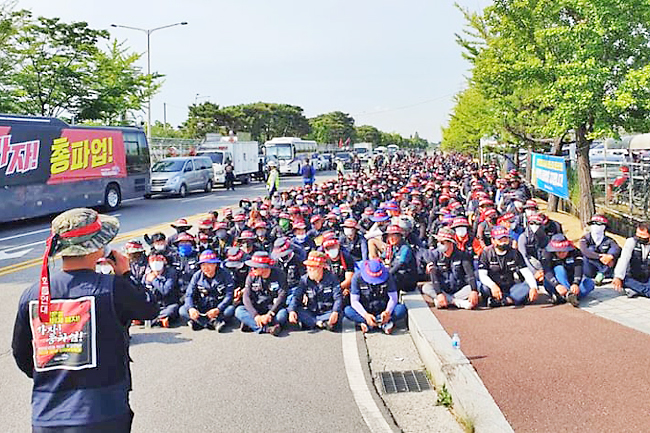CNA – Defiant South Korean truckers embarked on broader and more aggressive strike action yesterday, threatening to severely curtail deliveries of raw materials for semiconductors and petrochemical products.
Entering its fourth day, the strike protesting soaring fuel costs halved production at Hyundai Motor’s biggest factory complex on Thursday and has disrupted shipments for a range of companies including steelmaking giant POSCO.
Container traffic at ports has also slowed sharply. At Busan port, which accounts for 80 per cent of the country’s container activity, traffic was down to a third of normal levels yesterday, a government official said.
At Incheon port, it has fallen to 20 per cent of normal levels while at the port for Ulsan, the industrial hub where much of the strike action has occurred, container traffic has been completely suspended since Tuesday.
Some 7,500 members, or about 35 per cent of the Cargo Truckers Solidarity union, were expected to be on strike yesterday, the transport ministry said. The government estimates that about six per cent of the country’s 420,000 truck drivers belong to a union.

The union has contended that the numbers on strike are much higher than government estimates and that many non-union truckers are also refusing to work.
South Korea is a major supplier of semiconductors, smartphones, autos, batteries and electronics goods and the latest industrial action further raises uncertainty over global supply chains already disrupted by China’s strict COVID-19 restrictions and Russia’s invasion of Ukraine.
Faced with one of his first big economic challenges, new President Yoon Suk-yeol has taken what he calls a neutral stance, saying the government should not be involved too much.
That has alarmed some observers, who say Yoon’s remarks could hinder the government’s ability to come up with a solution.
“The government needs to review the union’s demands. They don’t need to accept them all, but I think they could make the situation a bit easier if they could consider giving out subsidies so truckers can deal with soaring fuel prices,” said Shin Se-don, an economics professor at Sookmyung Women’s University.
The union said a meeting with the government yesterday ended without an agreement and they would meet again today.
Share prices of major companies have been little affected on the view that the firms have sufficient inventories to ride out the strike for the time being.
Kim Gyeong-dong, a trucker union official, said the union ran out of funds to finance the strike on Thursday and that it was unlikely that the strike could last another 10 days.




